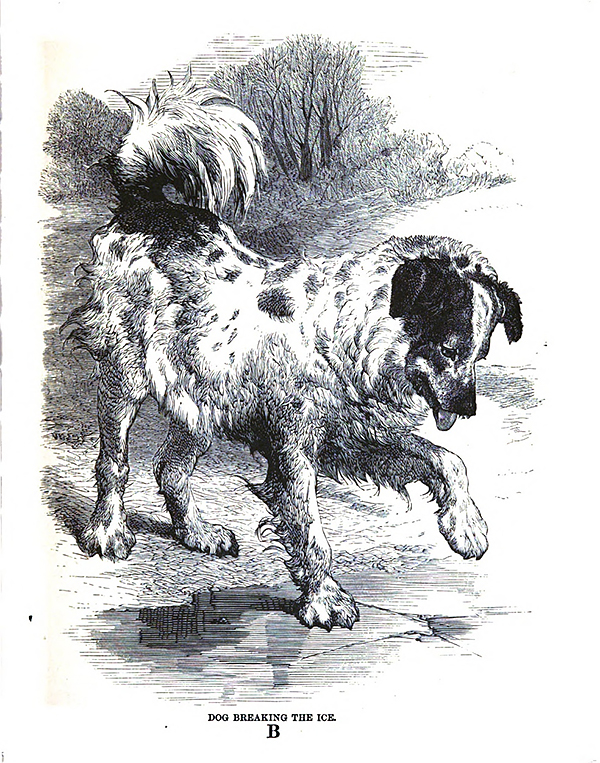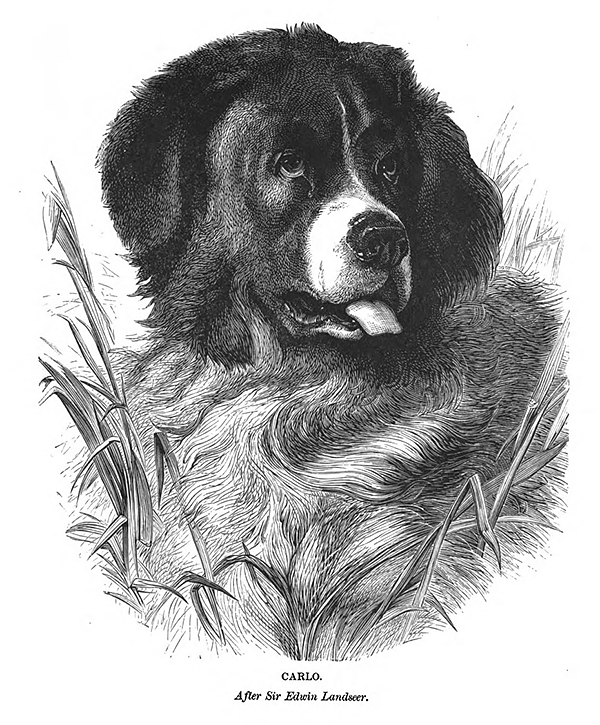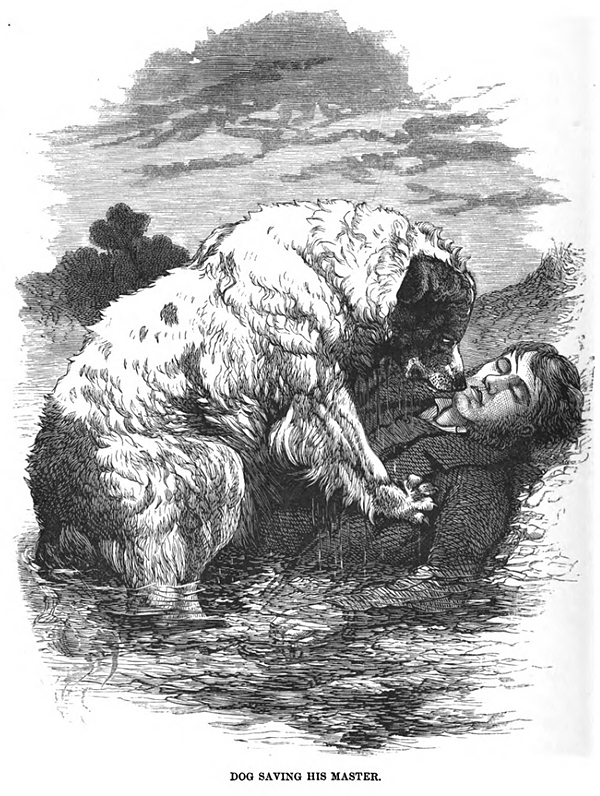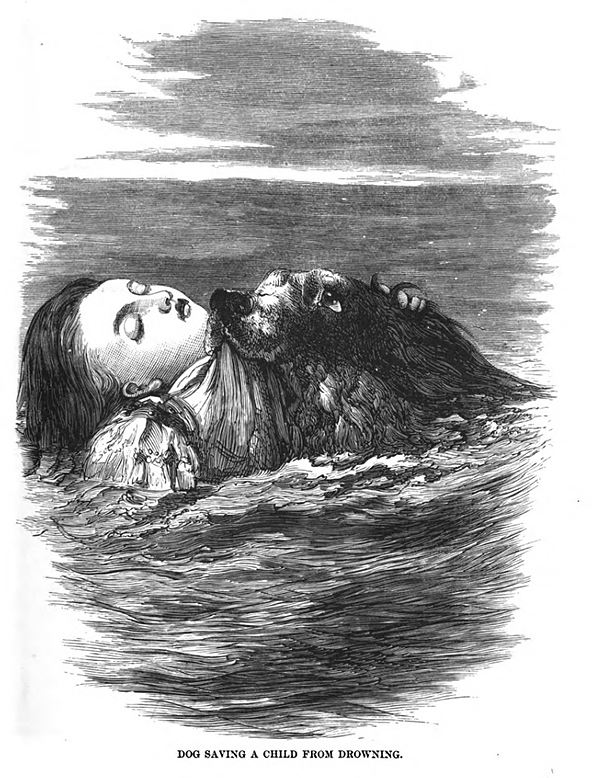[ Morris / Dogs and Their Doings ]
This book was first published in 1870 (S. W. Partridge: London), and reprinted several times. Text and images below are from the 1872 edition (New York: Harper & Brothers).
Francis Orpen Morris (1810 - 1893) was an English clergyman with a very strong interest in natural history, and authored a number of books, including children's books, on animals, particularly birds.
This heavily illustrated book jumps right into Newfoundlands even before the book begins: the frontispiece is a knock-off — though at least credited — of Sir Edwin Landseer's A Distinguished Member of the Humane Society. The engraver has used the head of the dog from Landseer's painting, and added some grasses. The work is also given the spurious title "Carlo," which we know is not the name of the dog who modeled A Distinguished Member. It probably refers to one of the anecdotes quoted by Morris which involved an actual Newfoundland with that name (see below). Of course, as I have mentioned elsewhere, "Carlo" was a common name for Newfoundlands in the 19th Century owing to the popularity of Francis Reynold's 1803 play The Caravan.
Note also that this identical image was separately published as a colored engraving under Landseer's name and entitled My Dog. You can read more about this particular act of unscrupulous publishing here at The Cultured Newf.
There are no credits for any of the artists or engravers involved in the creation of this volume.
Morris' book is largely a collection of previously published anecdotes, so many of the anecdotes he relates are not reprinted here on this page. Instead, you will links to the earlier version of his stories.
The first Newf anecdote (p. 16) is entitled "The Newfoundland Icebreaker," and is accompanied by an illustration:
The anecdote I am now about to give is from the pen of the Rev. J. C. Atkinson, a good and scientific naturalist:
"Walking with a favorite Newfoundland dog of great size, one frosty day, I observed the animals repeated disappointment on putting his head down, with the intention to drink, at sundry ice-covered pools. After one of these disappointments, I broke the ice with my foot, for my thirsty companion's behoof. The next time it seemed good to the dog to try and drink, instead of waiting for me to break the ice as before, he set his own huge paw forcibly on the ice, and, with a little effort, obtained water for himself." (60)
"Atkinson" would be John Christopher Atkinson (1814–1900), an English minister and author.

The next Newf-related anecdote (pp. 19 - 20), "A Newfound Dog's Punishment," is another borrowing:
Dr. Abell, says Mr. Youatt, in one of his lectures on phrenology, related a very striking anecdote of a New- foundland dog in Cork: "This dog was of a noble and generous disposition, and when he left his master's house was often assailed by several little noisy curs in the street. He usually passed them with apparent unconcern, as if they were beneath his notice; but one little creature was particularly troublesome, and at length carried his petulance so far as to bite the Newfoundland dog in the back of his leg. This was a degree of wanton insult which could not be patiently endured, and he instantly turned round, ran after the offender, and seized him by the poll. In this manner he carried him to the quay, and, holding him for some time over the water, at length dropped him into it. He did not, however, design that the culprit should be capitally punished; he waited a little while, until the offender was not only well ducked, but nearly sinking, and then he plunged in and brought him out safe to land. It would be difficult," says the doctor, "to conceive of any punishment more aptly contrived, or more complete in character. A variety of comparisons, and motives, and generous feelings, entered into the composition of this act." (19 -20)
The above anecdote is taken, largely verbatim, from William Youatt's The Dog (1845), treated here at The Cultured Newf. Youatt erred in attributing that anecdote to Dr. Richard Abell, a medical doctor; it was in fact taken by Youatt largely verbatim from Thomas Hancock's Essay on Instinct (1824), treated here at The Cultured Newf.
Morris' next anecdote, entitled "'Carlo,' the Gallant Protector" (pp. 20 - 21), is a verbatim quotation (acknowledged) from William Youatt's The Obligation and Extent of Humanity to Brutes, about Youatt's own Newfoundland protecting him from robbers. No need to repeat it here; you can read Youatt's text here in a new tab/window.
Up next (pp. 37 - 38) is an anecdote entitled "The Newfoundland's Rescue of an Enemy," about a Newfoundland rescuing his one-time mastiff nemesis from the sea. This story too is a verbatim quotation from another source. Morris' immediate source is "Anecdotes of Dogs" by "the Messrs. Chambers" — that is, the Scottish publishers William and Robert Chambers, whose multi-volume Chambers's Miscellany of Useful and Entertaining Tracts (1847) included, in its first volume, the essay to which Morris alludes. The Chambers' work itself consists largely of republished material. In this case they've taken this anecdote from a book by Edmund Jesse, who published the first edition of his Anecdotes of Dogs in 1847. Go here to read this anecdote (in a new tab/window) in Jesse's book.
Following that anecdote Morris quotes a passage from The School for Fathers (pp. 61 - 62), a moralizing tale for young adult readers by an author Morris mis-identifies as "J. Gwynne, Esq." The title page of that work actually bears the name "T. Gwynne," and although Morris couldn't have known, Gwynne was no "Esquire" — "T. Gwynne" was actually Josepha Heath Galston. The School for Fathers page here at The Cultured Newf quotes a little bit more of that work than Morris does.
Morris' next anecdote (pp. 62 - 63), which he titles "The Dog Who Saved His Master's Life," is also a direct quotation, this time from "Garrett, in his 'Marvels and Mysteries of Instinct." (Morris gets the title right, although the author's last name is correctly spelled "Garrat.") Garrat's book, first published in 1856, includes only one substantial mention of a Newfoundland doing water rescue, an anecdote which in turn was adapted from an earlier work. Garrat's book is treated here at The Cultured Newf.
Morris' work provided an illustration for this anecdote as well:
"Crab Capturing" is the title Morris gives to the next Newf-related anecdote (p. 75); it is an acknowledged direct quotation from Jonathan Couch's 1847 volume Illustrations of Instinct. Click here to read about the crab-eating Newf here at The Cultured Newf.
On the very next page of Morris' book (p. 76) is another quoted passage, here entitled "The Good-Natured Newfoundland," from Couch's book, mentioned just above, about how the very laid-back personality of a Newf made it hard for him to find a forever home. Use the link just above to read that story.
Next (p. 88) is an anecdote entitled "The Rescue of a Child." It too is presented in quotation marks, with the attribution being to Salad for the Social. This was an 1856 book by Francis Saunders; he in turn adapted this anecdote of a water rescue from an earlier source. The passage presented here by Morris is almost but not quite a verbatim quotation from Saunders' work; Morris makes one small change in one sentence. For the source, got to this discussion of Salad for the Social here at The Cultured Newf.
The following illustration accompanies Morris' presentation of this water-rescue anecdote:
"The Newfoundland's Thoughtfulness" (pp. 102 - 103) is Morris's next anecdote, a direct quotation from William Youatt's 1839 Obligation and Extent of Humanity to Brutes, treated here at The Cultured Newf.
Morris' next Newf-related anecdote is "The Triple Alliance"(135 - 137) which begins with Morris acknowleding his source, the "Cyclopedia of Natural History" (actually The British Cyclopedia of Natural History), then quoting the oft-repeated story about a Newfoundland who routinely fights with a neighbor's mastiff and another neighbor's bulldog, but one day recruits both of them to help him beat up a pack of dogs who attacked him. After that "triple alliance," the three dogs go back to being enemies. Morris follows his acknowledged source very closely; you may read the "Cyclopedia" entry here at The Cultured Newf. (This same anecdote also appeared in William and Robert Chambers 1845 multi-volume work Chambers's Miscellany of Useful and Entertaining Tracts, and in Edward Jesse's Anecdote of Dogs, first published in 1846 though that edition did not include this anecdote, which was added when Jesse issued an expanded 2nd edition in 1858.)
A similar anecdote closely follows the one above. What Morris titles "Partnership in Revenge" (137 - 138) comes, he says, from a direct source:
Mr. C. A. Wheeler, in a letter, supplies me with the following anecdote:
"A gentleman used to go twice a year to London, and remain near a week, leaving his horse at St. Albans, and going to and from thence by coach. He chanced, one journey, to have a small dog with him, and that he left, with the horse, at St. Albans. Returning at the end of a week, he was told by the hostler that on the day he (the gentleman) started for London, the innkeeper's dog broke loose and fixed on the other: when separated, the stranger bolted, and next day, returning with a large Newfoundland dog, the two deliberately walked up to the offender, and, after giving him a terrible punishment, departed, and had not been seen since. The Newfoundland dog being then described — 'Oh!' said the gentleman, 'it's all right.' The small dog had been home (twenty miles) and fetched his companion to help him in his revenge on mine host's Cerberus."
While it may well be that Morris did indeed receive the above anecdote in personal correspondence, the story sounds very similar to (though, indeed, much more realistic than) a story which appeared in the monthly Gentleman's Magazine in September of 1818, in which a small dog is left at an inn in St. Alban's, gets harrassed by a local dog, leaves and returns with a Newfoundland and the two of them beat up the harrasssing dog. At least in Morris' story the dog goes only 20 miles; in the earlier version in Gentleman's Magazine, the small dog has to travel at least 350 miles to get home, then 350 to get back to St. Alban's with the Newfoundland — and he does it in "several days"! You can read this early and hard-to-believe version here at The Cultured Newf.
The next Newf-related anecdote, here titled "Hiding the Whip-Shaft" (p. 104), is taken almost verbatim (and without attribution) from the October 26, 1858, edition of The Times (London), which itself attributed the brief article to the Glasgow Examiner. Click here to read the newspaper account here at The Cultured Newf.
Morris' final Newf-related story, here entitled "A Dog's Knowledge of Sunday" (p. 153), is a direct quotation (attributed) from Thomas Bell's 1837 book A History of British Quadrupeds. Go here to read of the bread-buying Newf here at The Cultured Newf.




